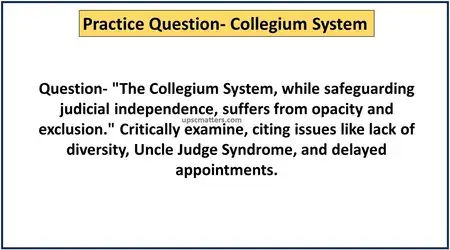- The Collegium System is a judicial innovation developed through Supreme Court judgments (Three Judges Cases), where the judiciary appoints judges to the higher judiciary without executive interference.
- It is lauded for protecting judicial independence — a basic feature of the Constitution — but has come under criticism for its lack of transparency, inclusivity, and accountability.
- Issues such as lack of diversity, Uncle Judge Syndrome, and delayed appointments have intensified debates over its effectiveness and fairness.
Question- “The Collegium System, while safeguarding judicial independence, suffers from opacity and exclusion.” Critically examine, citing issues like lack of diversity, Uncle Judge Syndrome, and delayed appointments.
Structure-
Introduction- briefly about Collegium System
Body-
- Merits of Collegium System
- Demerits of Collegium System (emphasise more)
- Judicial Responses and Attempts at Reform (Very Briefly)
- Way Forward
Conclusion.
Introduction- The Collegium System is a judicial innovation developed through Supreme Court judgments (Three Judges Cases), where the judiciary appoints judges to the higher judiciary without executive interference. It is lauded for protecting judicial independence — a basic feature of the Constitution — but has come under criticism for its lack of transparency, inclusivity, and accountability.
Merits of the Collegium System
Judicial Independence
- The system limits executive interference in appointments, safeguarding the autonomy of the judiciary.
- Example: In Second Judges Case (1993), the Supreme Court emphasized the primacy of the judiciary in appointments to protect its independence.
Protection Against Political Bias
- Removes risk of political appointments, unlike in some other democracies.
- Ensures that decisions are not influenced by the ruling government.
Continuity and Institutional Memory
- Judges involved in the selection process have firsthand knowledge of candidates’ judicial temperament and integrity.
Issues with the Collegium System
Opacity and Lack of Transparency
- Decisions are made behind closed doors without any recorded rationale.
- No objective criteria for selection, elevation, or rejection of candidates.
- Example: In 2023, the Supreme Court Collegium’s recommendation of Justice Saurabh Kirpal (an openly gay advocate) was rejected by the Centre, but the reasons from the Collegium were not fully disclosed initially.
- The Memorandum of Procedure (MoP) remains unfinalized since the NJAC judgment (2015), adding to the ambiguity.
Lack of Diversity
- The higher judiciary lacks representation from marginalized communities, women, and regional diversity.
- As of 2024: Only 3 women judges in the Supreme Court out of 34. Minimal representation from SC/ST/OBC communities and minority religions.
- Collegium’s opaque nature doesn’t reveal how diversity is factored into selections.
Uncle Judge Syndrome
- Judges in High Courts often have relatives practicing in the same court, raising concerns over nepotism and conflict of interest.
- Example: In multiple High Courts (like Allahabad and Punjab & Haryana), a significant number of judges have relatives in practice, leading to perceived or real bias.
- Undermines meritocracy and public faith in the judiciary.
Delayed Appointments and Vacancies
- The time taken for recommendations, government approval, and appointments leads to huge vacancies in higher judiciary.
- As of early 2024: Over 30% of posts vacant in High Courts. Over 50 lakh cases pending due to shortage of judges.
- Example: The delay in appointing Chief Justice of Manipur High Court despite Collegium’s recommendation was criticized for being politically motivated.
Executive-Judiciary Tussle
- Government often delays or sends back recommendations, causing friction and affecting judicial functioning.
- Example: The Law Minister’s criticism of the Collegium in 2023 led to open conflict, with the Supreme Court defending its primacy in judicial appointments.
Lack of Institutional Accountability
- Collegium decisions are not subject to scrutiny or checks and balances.
- No formal procedure for performance review or complaint redressal for judges.
Judicial Responses and Attempts to Reform Collegium system
Public Disclosure of Collegium Resolutions
- Since 2017, the SC started publishing Collegium decisions online, but reasons remain vague and subjective.
- Partial transparency without complete disclosure of selection criteria.
Struck Down NJAC (2015)
- The National Judicial Appointments Commission (NJAC), passed by Parliament and ratified by majority of states, was struck down as unconstitutional.
- SC argued it gave excessive power to the executive and endangered judicial independence.
Suggestions by Law Commissions and Committees
- The Law Commission (230th Report) recommended transparent criteria and broader consultation in appointments.
- Advocated for inclusion of civil society and academia in selection panels.
Way Forward: Suggested Reforms–Collegium System
Establish an Independent Judicial Appointments Commission (With Safeguards)
- A balanced body with representation from judiciary, executive, and eminent persons, ensuring transparency and independence.
- Lessons from NJAC’s failure must inform a revised, constitutionally compliant mechanism.
Codify Objective Criteria
- Transparent benchmarks for merit, diversity, and integrity should be adopted.
- Avoids arbitrary selections and builds public confidence.
Ensure Greater Representation
- Focused efforts to appoint more women, SC/ST/OBC, and minorities in higher judiciary.
- Regional diversity and representation of the Bar from smaller High Courts should be considered.
Address Delays in Appointments
- Time-bound decision-making by both Collegium and the government should be institutionalized.
- Judicial vacancies should be treated as a matter of national priority.
Introduce a Secretariat for Collegium
- A professional secretariat can assist in background checks, data analysis, and performance evaluations to support informed decisions.
Conclusion
- While the Collegium System has effectively shielded the judiciary from political influence, its non-transparent, elitist, and exclusionary character has undermined public trust.
- A reformed appointment mechanism, balancing judicial independence with accountability and diversity, is essential to uphold democratic values and restore credibility.
- The judiciary must itself take the lead in improving transparency and fairness, lest reforms be forced externally, potentially endangering its independence.
If you found this helpful, you might also like these articles:
📌 [https://upscmatters.com/quick-commerce-vs-kirana-stores-survival-future/ ]
📌 [https://upscmatters.com/buddhism-vs-jainism-vs-vedic-culture-a-comparison/ ]
They cover key concepts that will boost your preparation! 🚀
📢 Stay Updated with the Best UPSC Resources!
Join our Telegram Channel for:
✅ Daily Current Affairs
✅ Important Notes & PDFs
✅ Answer Writing Tips
✅ Strategy & Motivation
📲 Click the link to join now: [https://t.me/upscmatters] or [https://t.me/ramsirnotes]
Don’t miss out on valuable updates! 🚀

